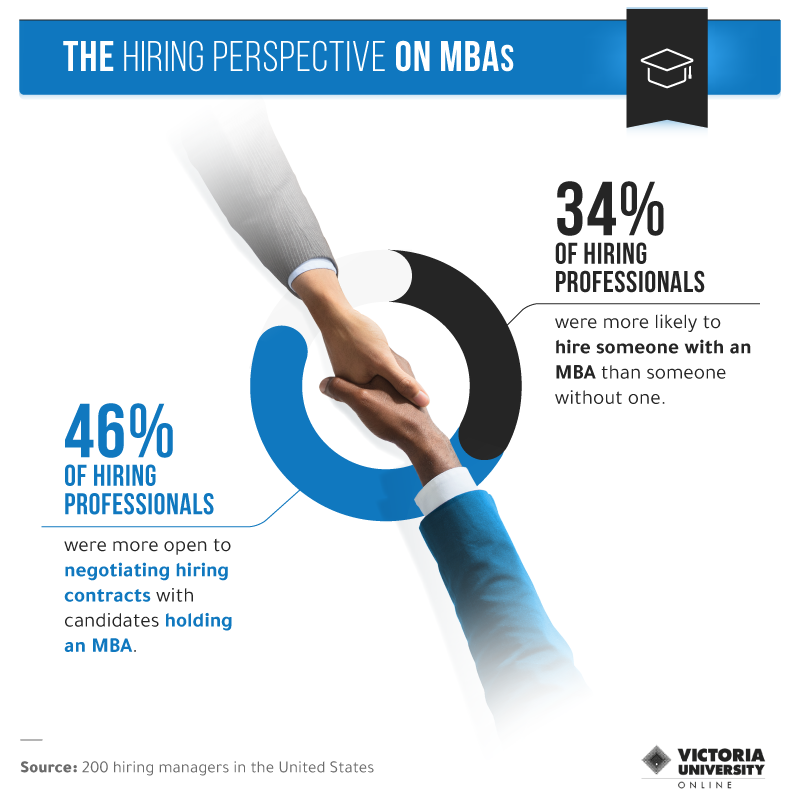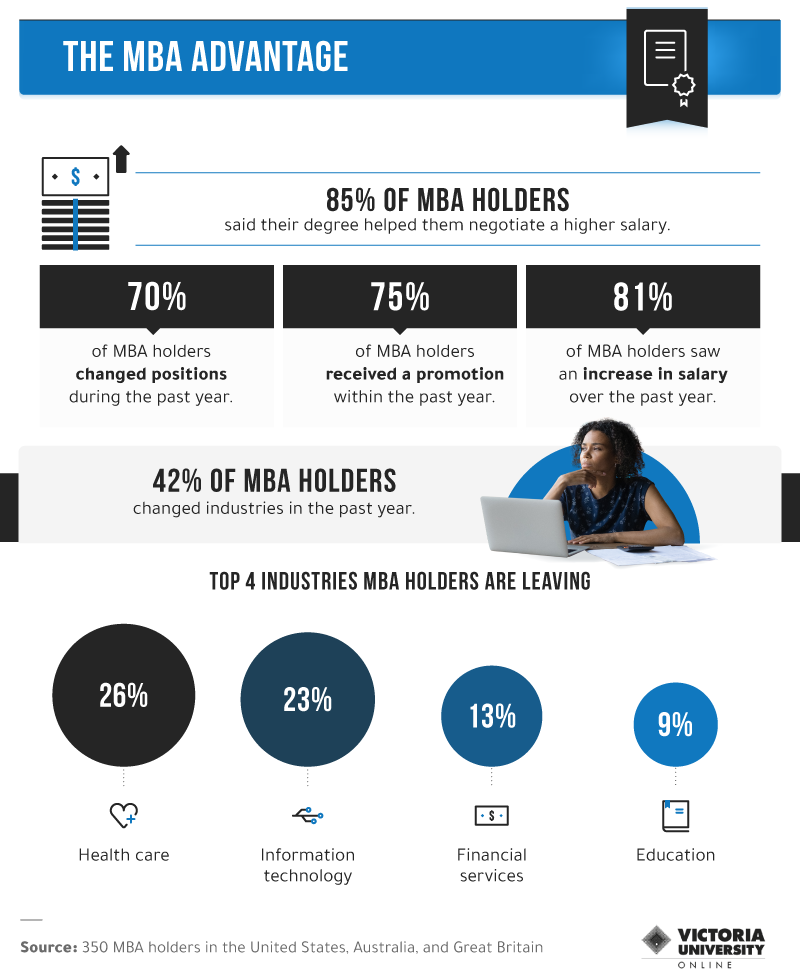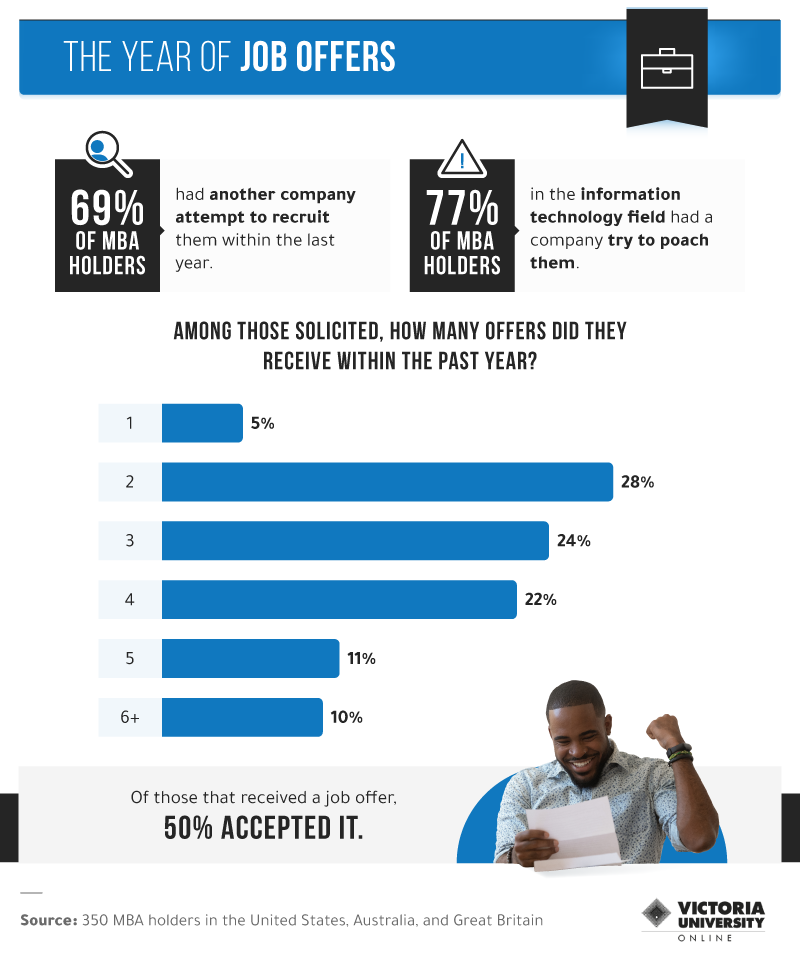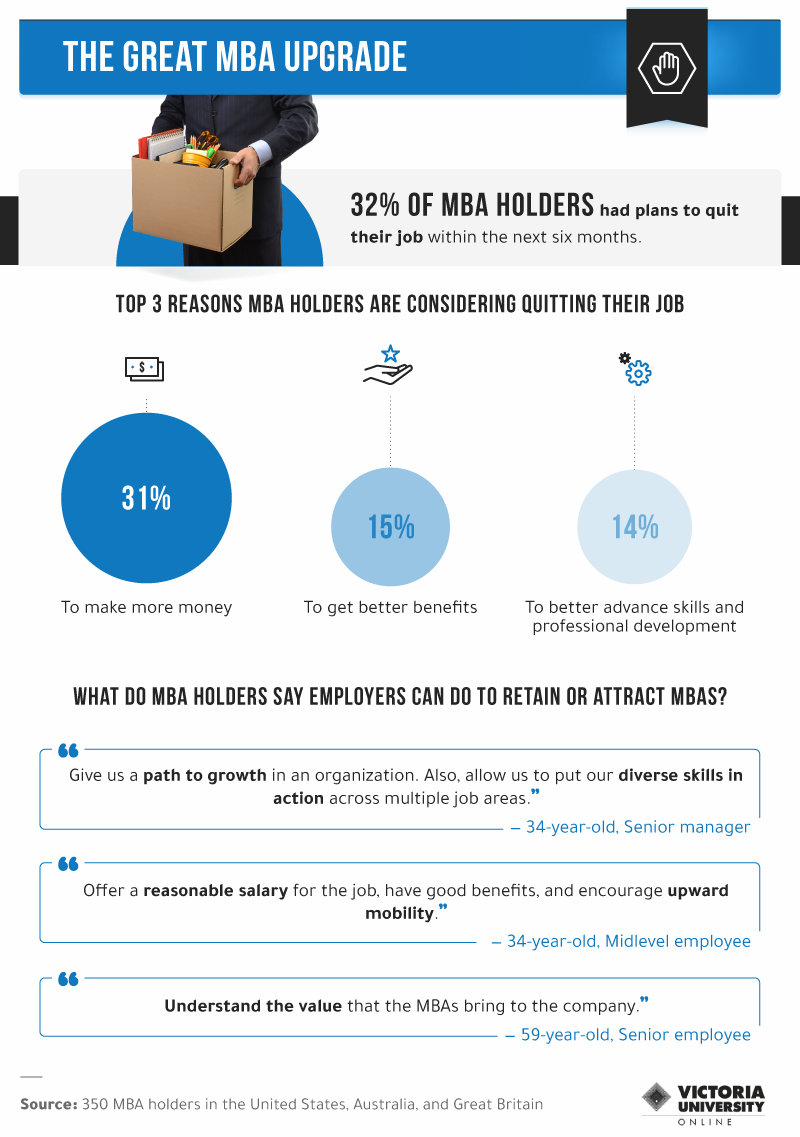
MBAs and the great resignation
The phenomenon known as the Great Resignation has changed the landscape entirely for job seekers, employees and employers. Thanks to plenty of pandemic-related factors, people have been leaving jobs in overwhelming numbers. And that extends not just to the average employee; even managers and higher-level workers are making the decision to jump ship and either try to find a better situation or reevaluate their careers altogether.
Despite all of this, there have been recent reports of MBA degrees resulting in higher salaries and better positions immediately after graduation.
So what have employees with MBAs been seeing in the job market throughout the Great Resignation? Have employers been working harder to retain them? What have salary increases among people with MBAs actually looked like lately?
This survey was conducted with 200 hiring managers throughout the U.S. and 350 MBA graduates across the U.S., Great Britain and Australia. If you’re interested to see how MBA graduates have fared during this turbulent time, read on.
Key findings
- 69 per cent of MBA graduates had another company attempt to recruit them within the last year.
- 85 per cent of MBA graduates believe their degree helped them negotiate a higher salary.
- Of MBA graduates who changed industries over the last year, 26 per cent left the healthcare industry.
A hiring manager’s perspective
The labour market has seen significant ups and downs over the last couple of years thanks to the pandemic and certainly, everyone is impacted. Hiring managers have had to readjust their strategy for finding talent and many are just trying to keep up. Some, however, have referred to the Great Resignation as more of a “reorganisation,” with companies shifting things around internally to avoid losing valuable employees to better-paying positions or ones with a more flexible structure.
In this survey, two hundred hiring managers weighed in on MBAs and their value.

It turns out that hiring managers hold MBAs in fairly high regard. The study showed that 34 per cent of them were more likely to hire someone with an MBA than someone without one. Considering that an MBA is beneficial to a career in many ways—from gaining practical experience in a specified field of study to having more financial and overall job security—it makes sense that hiring managers view MBAs as a benefit to the hiring process.
This perspective on MBAs seems to spill over into negotiating as well, with 42 per cent of hiring managers saying they were much more willing to negotiate contracts with job candidates who held an MBA.
Getting a leg up with an MBA
MBA graduates offer great advantages in the business world, especially if they have a specialisation. But even general MBAs can set an individual up for a quick transition into a career and offer a more rapid path toward growth opportunities.
It appears, then, that hiring managers have a favourable view of MBAs, especially amid the tough labour market of the past two years.
But what do MBA graduates say about it? Have those with MBAs changed jobs or careers and if so, what industries have seen the most employees leaving?

The Great Resignation has certainly had its advantages for MBA graduates, as 85 per cent said their degree has helped them negotiate a higher salary. Although 70 per cent said they’ve changed positions over the past year, 75 per cent said they actually received a promotion. This tracks with the value of MBAs over the course of the pandemic, as some MBAs have proven to be especially valuable.
Interestingly, however, 42 per cent of MBA graduates in our survey did say that they changed industries over the past year, with health care being the top sector that respondents reported leaving (26 per cent). This may be due to the strain COVID-19 put on healthcare workers, with many working long hours in harsh conditions without any extra compensation. Twenty-three per cent of respondents reported leaving the IT industry and 13 per cent had left financial services.
An offer you can’t refuse
To combat the negative impacts of the Great Resignation, many companies have had to step up their game to attract talent and make their roles more appealing to people who have left their jobs (not to mention retaining the employees who haven’t left). As a result, people in many fields and industries are actually getting better job offers than ever before.
How have MBA graduates fared when it comes to getting offers or being recruited elsewhere?

Notably, 69 percent of MBA graduates in the study said they’ve had another company try to recruit them over the past year. Poaching is rather common in the job world, especially among those with coveted degrees like MBAs, but it seems to have occurred more frequently in recent years.
Among respondents who’d been solicited by companies over the past year, 28 per cent said they’d received two offers, on average. Twenty-four per cent said they’d had three offers, while 22 per cent reported getting four offers. Interestingly, just 5 per cent of respondents only got a single offer, meaning that the vast majority of MBA graduates we surveyed got more than one offer. It’s entirely possible that this is due to companies competing for these talented individuals during the recent labour shortage.
Benefits of an MBA
The primary benefit of an MBA is that it gives you refined business knowledge and expertise that you can’t get from another degree program, while simultaneously training you for a specific industry. But one of the most overlooked aspects of an MBA is that it also sharpens your soft skills and provides you with a host of attributes that can come in handy when launching or even retaining and growing your career.

Overall, our study showed that MBA graduates found their soft skills to be more useful than hard skills in their careers. Soft skills are more interpersonal in nature and can prove to be invaluable when dealing with others. In addition to soft skills, though, there were certain courses that proved most beneficial to the respondents of our study.
Most notable among them was financial management, which 30 per cent of respondents said was the most useful course for their career. Eleven per cent said project management was most useful and 10 per cent said marketing.
Considering how crucial financial management is to business in almost every way, it’s no surprise that respondents to this study felt strongly about the financial courses they took.
Staying or going?
At the end of 2021, there were certainly signs that the Great Resignation showed no signs of slowing. This has proven to be a warning to employers, as many have continued to improve in certain areas to make jobs more appealing and to retain employees as much as possible.
Among MBA graduates who participated in this study, how many had their sights set on new roles and why?

An astonishing 32 per cent of MBA graduates said they planned on leaving their job in the next six months. The primary reason for MBA graduates wanting to leave their job is that they wanted to make more money (32 per cent), while 15 per cent said they wanted better benefits and 14 per cent were looking to advance their skills and professional development.
For many employees, seeing the way their employers handled the COVID-19 pandemic, shifting to work from home (and perhaps subsequently moving back to the office) has been a driving factor in looking for something better.
One thing is clear from the sentiments around MBA graduates leaving their jobs: Employers need to do more to retain them.
Taking the next step with VU Online
Getting an MBA at VU Online is a serious investment that people make with the specific intention of advancing their business career in a more fast-paced and beneficial way than through lower-level degrees. Our study certainly showed that while MBA graduates have an advantage over other employees, especially when it comes to salaries and job offers, many still felt that there are better options out there than their current situation and were strongly considering a great resignation of their own.
With that in mind, employers will certainly continue to step up their efforts to attract and retain the best employees in this ever-changing job market.
Navigating your career with an MBA can seem like a gargantuan task, especially when you’re new to an industry and especially during this unprecedented time. At Victoria University, we take the unknown away to develop career-relevant education solutions that make sense with your life and your path forward.
Methodology and limitations
This survey was conducted among 350 MBA graduates in the US, Great Britain and Australia, as well as 200 hiring managers throughout the U.S. The MBA graduates were surveyed via the Prolific platform and the hiring managers were surveyed via the Pollfish platform. This study has a +/-5 per cent margin of error on a 95 per cent confidence level for MBA graduates and a +/-7 per cent margin of error for hiring managers. In some cases, questions and answers have been paraphrased or rephrased for clarity. The data rely on self-reporting and potential issues with self-reported data include, but are not limited to, selective memory, telescoping and exaggeration.
Fair use statement
If you’re an MBA graduate or just someone who enjoyed our study, you’re welcome to share it. All we ask is that you link back to the findings and that your purposes are noncommercial.



